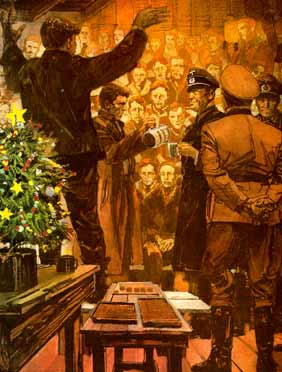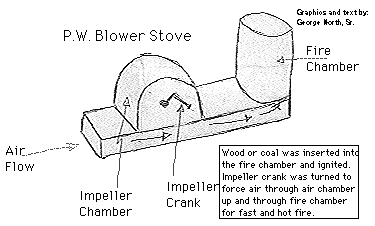Gene DuVall, a freelance writer from Eureka, Calif., was a WWII prisoner of war at Stalag VIIA in Germany--AS WAS MY FATHER.
... from the pages of The American Legion, December 1994
A Most Memorable Christmas
by Gene DuVall
"For a few moments 50 years ago, the enemies in Stalag VIIA shared the spirit of the season."
AUS MIT DU, SCHWINE HUND!--"Out with you, you low life!" These were the words I remember hearing every morning in Stalag VIIA, the German prisoner of war camp located in Moosburgh, Germany, 15 kilometers from Munich.
Although the winter of 1944 in Europe was the coldest in quite some time, we were looking forward to Christmas Day. The word was that we would be allowed to lay around and take it easy with no work details.

To discourage escape attempts, we were not allowed shoe laces, socks or belts. Very few of us had underwear. Of my own GI clothing, all that remained were the wool pants and shoes I hit Omaha Beach with on D-Day.
Most of the thousands of POWs in our camp were issued old French flannel army shirts, woolen trench coats and a woolen blanket with more holes in it than the material it was made of. The trench coat they gave me must have been made for a 7-foot tall French soldier. It dragged on the ground, and I could hardly walk in it.
Using a piece of sharp tin from a can received in an American Red Cross food parcel, I cut the coat off between my ankles and knees, and used a piece to make a ski mask, with
holes for eyes, nose and mouth. With the material left over, I sewed a pouch into my coat to sneak loot from work details into the prison camp.
The blanket was more like a horse blanket and the odor seemed to confirm it. Some of the POWs were lucky enough to find or steal burlap and other materials to make extra blankets and clothing.
Thanks to the ingenuity of a British POW, each man made his own miniature cook stove out of tin cans from the food parcels.

Our barracks were thin-walled, unheated buildings without water or electricity. We slept in bunks stacked three high, made of salvaged wood, with bug-infested straw mattresses. To take the chill out of the air, we lit candles found or stolen on work details in Munich.
The guys mostly played cards, read or talked about going home. During one of those days we were killing time, I suggested putting on a Christmas play to help the morale of the men. Everyone thought it a good idea, except for one man, who I'll call Joe.
Joe was more depressed than any man in the barracks. Most of us felt he was suicidal. Maybe this would give him something to think about, instead of focusing on the loneliness and despair that was eating at him.
The word was spread and the idea caught on like wildfire. Committees were formed, and our barracks leader—a natural-born catalyst—was chosen as director. We never found out how he managed to get the lumber to build the stage and benches for the audience.
Everyone continued to scrounge things suitable for making music, decorations, or something to eat and drink. When things were brought in, they'd be hidden under mattresses or floor boards, or buried.
As Christmas drew near, the anticipation and enthusiasm grew more contagious and magical. An ex-stage director was found among the POWs. Choirs were formed, and a magician, impersonators, comedians, actors, writers, ushers and stage hands stepped forward. There were so many volunteers they couldn't all be put to work.
The GIs who smoked chipped in one cigarette each to bribe the guard for a Christmas tree. Ornaments were made of tin, paper, wood and cloth, and someone scrounged several cans of paint to color them with.
Raisins, prunes, sugar, chocolate and powdered milk from Red Cross food parcels were hoarded for six weeks. They would be added to several loaves of black bread to make a pudding that would be given to each man as he came to watch the show. The rest of the raisins, prunes and sugar would be brewed into a strong alcoholic drink that would be cut with water and portioned out to each man. By Christmas Eve all was ready.
The building we used to present the show held 100 men at a time. We scheduled the show hourly, so all the men in our section of the camp could see it. Where the energy from our weakened bodies came from, I'll never know. I suppose our determination to generate some happiness for our fellow GIs spurred us on. Not only Joe needed it, we all needed it.
The first show was at 8 a.m., Christmas day. The opening hymn, "O Come All Ye Faithful," brought so many tears, we thought we'd have to stop the show. And there in the very first row of the choir was Joe, singing his head off.
The music and laughter could be heard throughout the camp. After the audience filed out of our third show, we heard the distinctive thump of German boots coming through the door. In came a German colonel, two majors, three captains, numerous lieutenants and about 60 enlisted men.
We feared they had come to put an end to our Christmas celebration. But, instead, they trooped to the front benches and sat down. The colonel then motioned us to proceed with the show.
The head usher, who spoke fluent German, climbed on the stage and dedicated the opening hymn to the German officers and enlisted men. Then the ushers passed out a slice of pudding and a drink to each German soldier.
The Germans were overwhelmed to see that someone in our situation could treat the enemy with such kindness. Some on both sides cried, including me.
After the performance, the German guards shook our hands and thanked us, saying sehr gate and danke shoe. There were tears and happy smiles on their faces, as well as our own.
From that day forward, Joe was a new man, helping to lift spirits wherever he could. As for the German guards and us POWs, all the animosities were put aside that Christmas morning. But the next day, things were back to normal.
Yes, it was a memorable Christmas, but one I would rather remember than repeat.